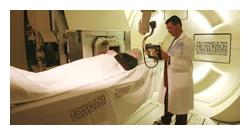
University of Texas M.D. Anderson Cancer Centers Proton Therapy Center.
January 13, 2010 – There is growing awareness about the advantages of proton therapy compared to conventional photon radiation therapy, especially when treating pediatric patients. Protons release most of their energy when they hit the tumor and deliver no exit dose beyond the tumor boundary, unlike photons. This enables the dose to better conform to the tumor and minimizes damage to healthy surrounding tissue, and enabling the radiation oncologist can potentially deliver an even greater dose. This less damaging deliver of dos is especially important when treating children by reducing radiation to growing and developing tissues.
As the proton therapy becomes more prevalent, the first proton-certified radiation therapists (RTTs) in the U.S. received advanced proton therapy certificates was notable. The RTTs earned their certificates at the Ivy Tech Community College-Bloomington program, which provides 16 college credits or the equivalent of two years of continuing education (CE) credits from the American Registry of Radiologic Technologists (ARRT). A portion of the program was held at the ProCure Training and Development Center in Bloomington, a training facility dedicated to proton therapy.
More specialized training in the field will be needed as more proton therapy spring up. Procure, a proton therapy center development company, is currently building a network of proton therapy treatment facilities across the United States. Construction is under way on a ProCure facility in suburban Chicago. Additional centers are in development in suburban Detroit, Mich., South Florida, Seattle, Wash., and Somerset, N.J.
For more information: www.ivytech.edu/bloomington and www.procure.com


 January 30, 2026
January 30, 2026 









